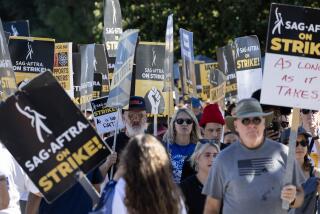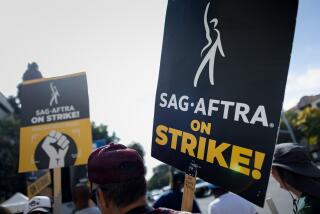NHL Players Reject Proposal, Hopes of Saving Season Slim
- Share via
NEW YORK — Having rejected each other’s “last” offer, the NHL and its players have left themselves little maneuvering room--and even less time--to reach an agreement before the Tuesday deadline set by Commissioner Gary Bettman for canceling the season.
Dissatisfied with an offer that removed the hated payroll tax but left equally unpalatable restrictions on free agency and salary arbitration, players on Sunday turned down a proposal they had received less than 24 hours earlier. Bettman and Bob Goodenow, executive director of the NHL Players Assn., will meet today in New York, but both acknowledged the prospects for saving the season are faint.
“I don’t think there should be optimism. We obviously are in a very serious, serious, difficult situation,” Goodenow said. “There’s no reason for optimism. But I think it’s incumbent on both sides to see if there is a common ground.”
However, during an interview with The Times in his office Sunday, Bettman said the union’s expectation that he is open to negotiation on key points “is an assumption that they should not rely on because my instructions from the Board (of Governors) is that this is our best shot. As a substantive matter, this is the proposal that has to be the basis of a deal.”
Bettman called the offer, which caused great debate among the governors and was scorned by seven of the 26, “the least I could get through the owners.” They would not be apt to approve a deal that made other major concessions.
“If it wasn’t good enough for the players, it just means there is no deal to be made and those (owners) who would prefer to have a salary cap or a tax, even at the cost of a season, will probably have their way,” Bettman said.
Even something seemingly simple, such as compromising on the age for unrestricted free agency, might be impossible. The NHL proposed a qualifying age of 32, two years older than the union’s proposal, but Bettman said he likely would not settle at 31.
“That would be a big problem,” Bettman said. “Free agency without a tax or a cap is a huge problem. Thirty-two is a problem, but I got owners to accept that. . . .
“I’ve gone to owners from Day One and said, ‘You’ve got to give the players some unrestricted free agency,’ and that is extraordinary, because every other sports league that gave it has done it in the context of a cap. I said, ‘OK, you can have it at age 32.’ Which is about 100 players, or one in six. Now, they’re saying they’ve got to have it at 30. Then all of this is about gains for the players, not givebacks to help deal with salary escalation. If this is the change in focus and this is what this is all about, then the season may well be doomed.”
Said Chicago Blackhawk center Jeremy Roenick: “When you get limits on what you can make, where you can go and when you can go, to the limits they put on us, it’s just not right. It’s almost like a form of Communism. I can’t become a free agent until I’m 32 years old? Who’s going to want me at 32, anyway?”
About 125 players joined a conference call Sunday to discuss the NHL offer, which countered a proposal the union made last Wednesday. Only the 26 club representatives voted, per union bylaws that call for a rank-and-file vote only if the negotiating committee presents a proposal to be ratified. Goodenow said the rejection was unanimous.
The Kings’ Wayne Gretzky, who spoke up to back his peers during the call, planned to fly to Toronto today to show his support.
Said teammate Marty McSorley, a member of the NHLPA negotiating committee: “I could show you line by line how the Kings could make millions of dollars on their proposal. We’re very disappointed (the union’s last proposal) was turned down.”
David Lefevre, governor of the Tampa Bay Lightning, told the St. Petersburg Times: “This is not a candy store where the players can have everything they want. They’ve gotten their appetizer and their main course. They are going to have to share dessert. If they’re not willing to share dessert, there will be no hockey season.”
Goodenow said the union had wide-ranging differences with the league, but he cited as particularly objectionable a clause that gave the NHL the right to reopen the agreement after the 1997-98 season without giving players that right. “There’s a number of issues, but that certainly would be ranked one of the ones toward the top,” he said.
Bettman defended it as a way for the NHL to stem its losses should salary growth outstrip revenue growth under the new deal. He said the league could conceivably continue to accrue a loss; NHL figures claim losses of nearly $70 million over the last two seasons.
“The goal is to create enough drag to give us an opportunity to grow this sport fast enough so that revenues can begin to catch up with, and hopefully overtake the increases in expenditures,” he said. “We’re not as confident as the players that the types of system we’re talking about, as opposed to a cap or tax, would work as well.
“In the course of these negotiations we offered guarantees that salaries would not drop in percentage or in absolute dollar amount. The players said they had no interest in those things. Since we’re not talking about a system with a tax, if it doesn’t work, we think we need to have at least one window where we can say, ‘Let’s talk again.’ ”
Players were not sure what to expect in today’s talks. The union will be represented by Goodenow and attorneys Bob Riley and John McCambridge; Bettman is likely to be joined by senior vice presidents Jeff Pash and Brian Burke.
“This is still an attack, not a negotiation,” King goaltender Kelly Hrudey said.
Said Bob Corkum, the Mighty Ducks’ union representative: “I think Gary’s going to have to come a long way if anything is going to be done. He thinks he’s right and we definitely believe we’ve given as much as we can.”
Tony Tavares, president of the Mighty Ducks, said he didn’t follow the players’ thinking. “Rationally, the offer should have been accepted,” he said. “First and foremost, I’m concerned about the players. I fear for them. Somehow the league will survive. I thought our offer was a strikeable deal. I don’t know why it was rejected.”
Goodenow said he believes Bettman’s Tuesday noon (Eastern time) deadline is firm, making cancellation more likely than ever.
“The worst part,” Hrudey said, “is it’s a loss-loss for everyone.”
Times staff writers Lisa Dillman and Elliott Teaford contributed to this story.
More to Read
Go beyond the scoreboard
Get the latest on L.A.'s teams in the daily Sports Report newsletter.
You may occasionally receive promotional content from the Los Angeles Times.







